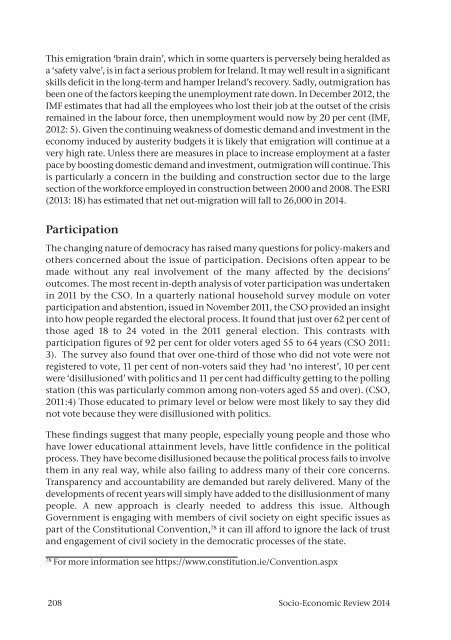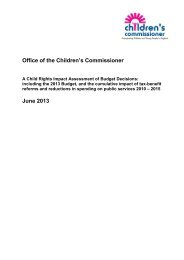2014-04-22 - Socio Economic Review 2014 - Full text and cover - FINAL
2014-04-22 - Socio Economic Review 2014 - Full text and cover - FINAL
2014-04-22 - Socio Economic Review 2014 - Full text and cover - FINAL
You also want an ePaper? Increase the reach of your titles
YUMPU automatically turns print PDFs into web optimized ePapers that Google loves.
This emigration ‘brain drain’, which in some quarters is perversely being heralded as<br />
a ‘safety valve’, is in fact a serious problem for Irel<strong>and</strong>. It may well result in a significant<br />
skills deficit in the long-term <strong>and</strong> hamper Irel<strong>and</strong>’s re<strong>cover</strong>y. Sadly, outmigration has<br />
been one of the factors keeping the unemployment rate down. In December 2012, the<br />
IMF estimates that had all the employees who lost their job at the outset of the crisis<br />
remained in the labour force, then unemployment would now by 20 per cent (IMF,<br />
2012: 5). Given the continuing weakness of domestic dem<strong>and</strong> <strong>and</strong> investment in the<br />
economy induced by austerity budgets it is likely that emigration will continue at a<br />
very high rate. Unless there are measures in place to increase employment at a faster<br />
pace by boosting domestic dem<strong>and</strong> <strong>and</strong> investment, outmigration will continue. This<br />
is particularly a concern in the building <strong>and</strong> construction sector due to the large<br />
section of the workforce employed in construction between 2000 <strong>and</strong> 2008. The ESRI<br />
(2013: 18) has estimated that net out-migration will fall to 26,000 in <strong>2014</strong>.<br />
participation<br />
The changing nature of democracy has raised many questions for policy-makers <strong>and</strong><br />
others concerned about the issue of participation. Decisions often appear to be<br />
made without any real involvement of the many affected by the decisions’<br />
outcomes. The most recent in-depth analysis of voter participation was undertaken<br />
in 2011 by the CSO. In a quarterly national household survey module on voter<br />
participation <strong>and</strong> abstention, issued in November 2011, the CSO provided an insight<br />
into how people regarded the electoral process. It found that just over 62 per cent of<br />
those aged 18 to 24 voted in the 2011 general election. This contrasts with<br />
participation figures of 92 per cent for older voters aged 55 to 64 years (CSO 2011:<br />
3). The survey also found that over one-third of those who did not vote were not<br />
registered to vote, 11 per cent of non-voters said they had ‘no interest’, 10 per cent<br />
were ‘disillusioned’ with politics <strong>and</strong> 11 per cent had difficulty getting to the polling<br />
station (this was particularly common among non-voters aged 55 <strong>and</strong> over). (CSO,<br />
2011:4) Those educated to primary level or below were most likely to say they did<br />
not vote because they were disillusioned with politics.<br />
These findings suggest that many people, especially young people <strong>and</strong> those who<br />
have lower educational attainment levels, have little confidence in the political<br />
process. They have become disillusioned because the political process fails to involve<br />
them in any real way, while also failing to address many of their core concerns.<br />
Transparency <strong>and</strong> accountability are dem<strong>and</strong>ed but rarely delivered. Many of the<br />
developments of recent years will simply have added to the disillusionment of many<br />
people. A new approach is clearly needed to address this issue. Although<br />
Government is engaging with members of civil society on eight specific issues as<br />
part of the Constitutional Convention, 78 it can ill afford to ignore the lack of trust<br />
<strong>and</strong> engagement of civil society in the democratic processes of the state.<br />
78<br />
For more information see https://www.constitution.ie/Convention.aspx<br />
208 <strong>Socio</strong>-<strong>Economic</strong> <strong>Review</strong> <strong>2014</strong>



